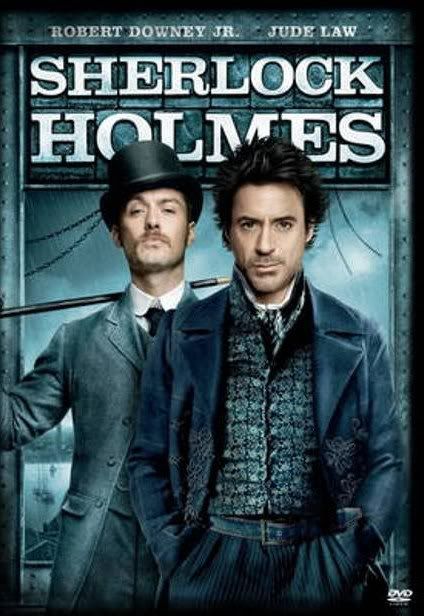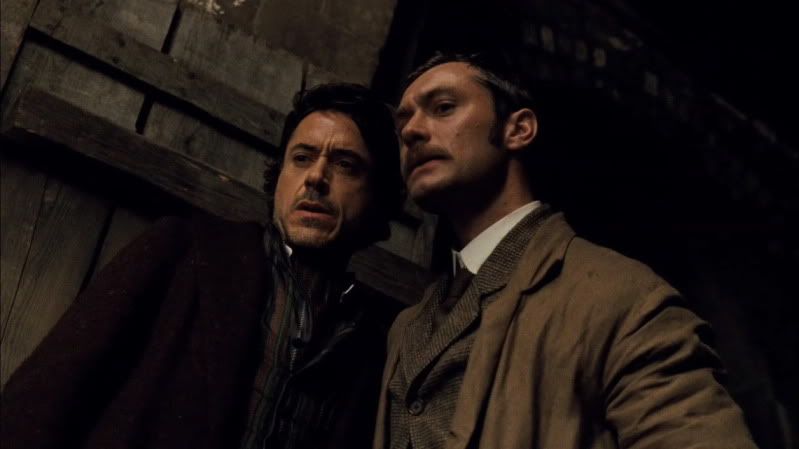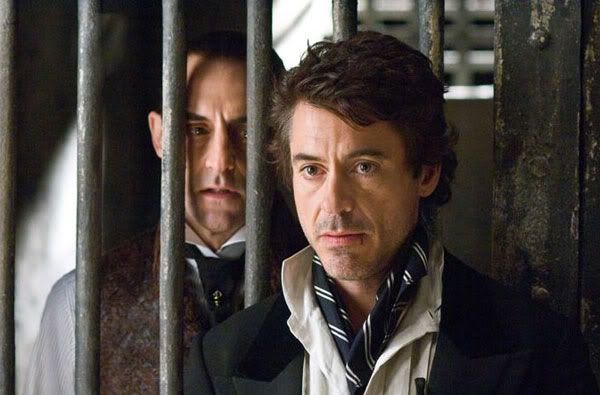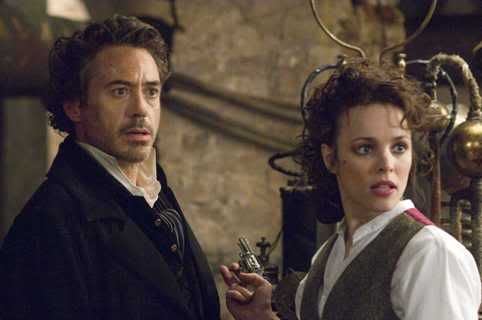
[audio:http://www.blueinkalchemy.com/uploads/holmes.mp3]
Necessity is the mother of invention. Along with being something Sherlock Holmes himself might utter while investigating a case, this idiom is also the reason I’m reviewing Guy Ritchie’s recent feature-film treatment of Sir Arthur Conan Doyle’s detective. I was originally planning to subject myself to the apparent mediocrity of The Taking of Pelham 123, since it’s been a while since I’ve found a movie average enough to warrant my ire, but my financial situation has caused Netflix to give me dirty looks instead of instantly streaming movies until I get my act together. Surprisingly, though, my desire to sound more like a critic and less like a fanboy is still going to be satisfied. You see, if it weren’t for the presence of Holmes & Watson, Sherlock Holmes would feel a lot like a movie that’s trying to both follow the lead of Pirates of the Caribbean and shamelessly appeal to the steampunk kids.

When it comes to Victorian England it’s hard to imagine a detective with more fame, quirks and intensity than Sherlock Holmes. He’s often called in by Scotland Yard to help them solve the more baffling crimes that cross their desk, when he isn’t employed by private interests. For years, assistance has come to Holmes in the person of John Watson, an Army veteran and skilled doctor. However, Watson is intending to get married which means he’ll be moving out of their shared living quarters on 221B Baker Street. Holmes is, for his part, unhappy with this situation and thus begins acting out, until the perpetrator of the last case on which the men worked, one Lord Blackwood, apparently rises from the dead. If there’s anybody from London that can figure out how this resurrection worked, it’s Sherlock Holmes.
Then again, neither Encyclopedia Brown nor Nancy Drew had been born yet. The main plot of Sherlock Holmes isn’t really all that mysterious. There’s no real cunning at work that Dan Brown couldn’t cook up to sell a few more novels that have readers picturing Tom Hanks in a hilarious mullet. It isn’t necessarily bad writing, as the facts do come together relatively well without major plot holes. If you pay attention, you can see what’s really going on even as people are bandying about words like “the dark arts” and “sacred order” as if Voldemort’s about to show up. (Wow, I am really going for a high score of pop culture references, aren’t I?)

The definition of bromance.
Now, if that was where the film stopped, just at the not-so-mysterious mystery plot, I’d pass it up. But it gives us something great wrapped around this somewhat mediocre story. Robert Downey Jr. is, to be honest, the sort of Holmes I always envisioned Holmes as being. Now, I’ve enjoyed the portrayal of the legendary detective by the likes of Basil Rathbone and Jeremy Brett, but this disheveled, twitchy, slightly neurotic and way too brilliant for his own good Holmes really strikes a chord with me. Brilliance and madness are separated by only the thinnest of lines, and while past Holmes often play with that division, Downey dances across that line with a sense of abandon that’s a joy to behold. He’s not quite as great as Hugh Laurie’s Doctor House, but he’s pretty damn close.
Over and above Downey’s performance is that of Jude Law as Watson. A lot of people who’ve gotten hold of Doyle’s material seem to think that Holmes should always be the brilliant one and Watson should only play second fiddle, being two steps behind Holmes or so rotund he has trouble keeping up. Guy Ritchie and the writers chuck those previous notions out the window, embracing Watson as an equal to Holmes, not just a straight man to the main act. Again, someone’s been watching episodes of House, since this Watson, which may be the best I’ve ever seen, strikes a resemblance with that mad doctor’s long-suffering best friend, Wilson. Together, Downey and Law have fantastic chemistry that makes the B-plot of Watson’s upcoming marriage every bit as engaging as the arcane conspiracy A-plot tries to be.

“Join me, Holmes, and I’ll make you forget all about Watson. We’ll be together every night.”
“…Blackwood, are you asking me out?”
On top of the two leading men are multiple things for Sherlockians to enjoy. There’s a lot of references to things mentioned even in passing within the pages of Doyle’s 56 short stories and 4 novels featuring Holmes. From a certain bullet pattern to Holmes’ substance abuse, if you pay attention you’ll be able to draw all sorts of parallels and point to where these references are rooted. A reference that requires no research is the presence of Irene Adler, played delightfully by Rachel McAdams. Mentioned in one story as a woman that bested Holmes at his own game, Adler has grown to rather gargantuan proportions in later fan works. The notion that Holmes would occasionally box is ramped up to give the film more action, and a gadget fixation that was tangential at best allows some of the technology of the Victorian era that inspired the steampunk movement to appear along side the two-fisted adventuring and witty banter. None of this is bad, per se, but it does feel at times like a bit of pandering.
The interesting thing is, none of these elements that I’ve taken shots at really stop the film from holding up as a well-paced period adventure. Sherlock Holmes works, and I was entertained pretty much from start to finish. If the mystery had been a little bit more clever I would be tempted to consider it a must-buy. As it is, it’s definitely worth a rental before you decide to buy it. I’m definitely curious to watch it again to see if there are more Doyle references I missed the first time. There’s also the fact I watched it without my wife and she’s going to love this Holmes.

“Blackwood came on to me, if you can believe that.”
“I can indeed. You do look like Tony Stark.”
“…Who?”
In closing, I can’t help but feel like Guy Ritchie cribbed a few notes from Christopher Nolan. Yeah, I know, more pop culture references incoming, but stick with me. At the end of Batman Begins, Gordon hands the Caped Crusader a particular playing card. Guess who showed up in The Dark Knight and pretty much walked away with the whole damn picture? Now, I’m not saying that the similar mention made in Sherlock Holmes is going to result in a similar outcome, but I’ve heard the likes of Chrisoph Waltz and Daniel Day-Lewis are up for the part in question. I think we’ll be finding out next year, and I’ll be trying really hard not to get my hopes up. With a Holmes and Watson this good, could we please have a villain worthy of their abilities that doesn’t come off as over-the-top or campy? Can we please have a sequel to a film based on one of the foundational works responsible for my interest in fiction that works as well as The Two Towers did in relation to Fellowship of the Ring? Guy Ritchie, if you read or hear this, mate, would you please make sure the sequel to Sherlock Holmes doesn’t suck?
Please?
Josh Loomis can’t always make it to the local megaplex, and thus must turn to alternative forms of cinematic entertainment. There might not be overpriced soda pop & over-buttered popcorn, and it’s unclear if this week’s film came in the mail or was delivered via the dark & mysterious tubes of the Internet. Only one thing is certain… IT CAME FROM NETFLIX.


